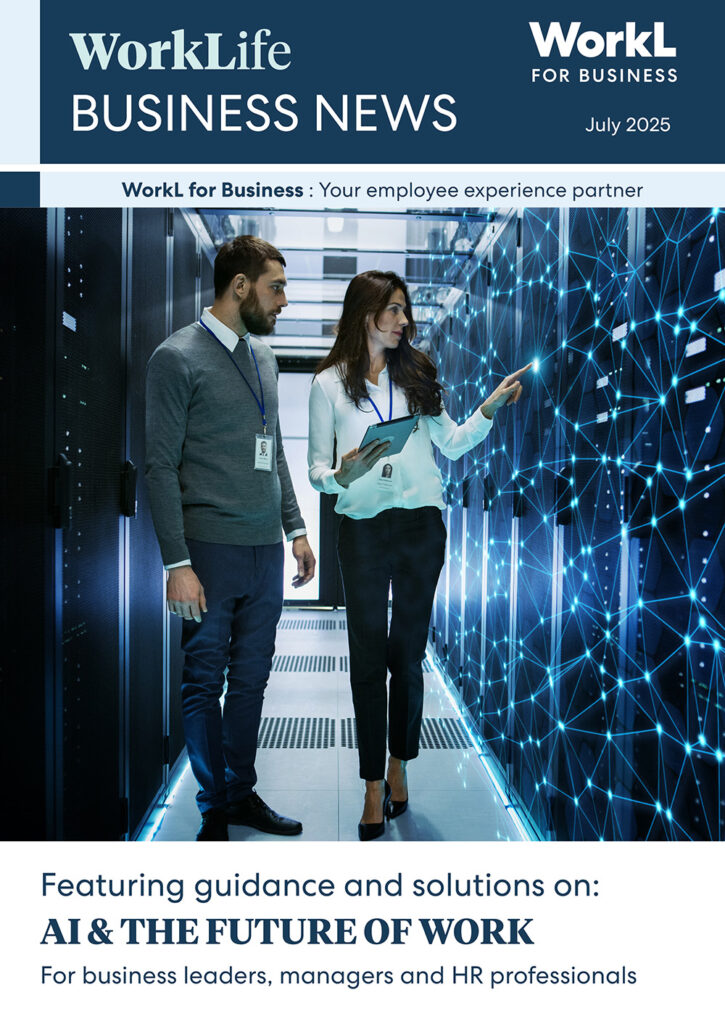Explore the latest edition of WorkLife Business News, focusing on the heart of DEI: How organisations can create a sense of belonging.
View Edition.
July 2025
Written by Emma James, Head of Employee Experience Solutions at WorkL For Business.
As technology and AI continue to redefine our workplaces, it’s easy to assume the future of work is digital. But the one constant, true driver of innovation, loyalty, and performance is still the human experience. Amid change and uncertainty, employee happiness is no longer a ‘nice to have’: It’s the strategic foundation for business success.
When you place happiness at the heart of your business strategy, you don’t just create a better workplace; you unlock retention, resilience, and growth. Here are five essential pillars to help your organisation put people first:
The most engaging and high-performing organisations are creating personalised experiences across the employee journey. This could be tailored learning and development plans or wellbeing support that adapts to each person’s needs: Personalisation builds a sense of value and care. Get this right from onboarding to exit, and you’ll see lasting engagement.
Happiness isn’t driven by pay alone: It comes from feeling seen, trusted, and connected. Start by empowering your leaders to ensure they are building trust, showing empathy, and engaging in two-way conversations. Then you can build upon fostering a common sense of purpose and community across your teams through volunteering, social initiatives, recognition and innovation days. Every employee should feel their contribution counts.
People who feel heard are more motivated and productive. Do you have systems in place to regularly gather and act on feedback? Annual surveys, pulse checks and lifecycle touchpoints create a feedback loop that drives action and builds trust. Listening, when followed by meaningful change, is a key differentiator in today’s workforce.
Flexible working isn’t just a perk; it’s a demand from today’s talent. Whether it’s hybrid arrangements, smarter rota planning or adaptive scheduling for frontline teams, flexibility fuels wellbeing. Train managers to have open conversations about what flexibility looks like for each person, from interviews to day-to-day management.
You can’t improve what you don’t measure. Track employee happiness consistently and link it to wider business KPIs such as retention, customer satisfaction and productivity. This data isn’t just HR’s responsibility; it’s a vital strategic tool, just as important as financial reporting.
The future of work is undeniably shaped by technology, but it will ultimately be defined by how we treat people. By prioritising workplace happiness as a core business metric, you don’t just create a great place to work; you create a workplace ready for the future. Focus on personalisation, belonging, listening, flexibility and meaningful measurement, and you’ll build an organisation where both people and performance thrive.
Need some support bringing these 5 pillars to life? Reach out to our Employee Experience experts to find out about Your Workplace Happiness Toolkit : A series of guides, workshops and expert advice to make employee happiness a priority with your organisation. Reach out to me on email here: emma.james@workl.com
Comments from other Employee Experience experts:
‘For us, listening is a non-negotiable, so we can understand the motivations and challenges of our colleagues. For our frontline teams in particular, surveys are not enough – the insights of our elected colleague representatives bring to life qualitative results, meaningful actions and shine a light on the day to day experiences of our teams.’
Harriet Reddish, Head of Internal Communications – Ocado Logistics.
When you truly listen to your team – not just to tick a box, but to understand them – you begin to build something powerful. At Dishoom, we’ve learned that happiness isn’t a soft metric. It’s the pulse of our culture, the reason people stay, and the spark behind great service. People first, always – guided by Seva, that big-hearted care for others in everything we do.
– Tyler Rose, Head of Internal Communications, Dishoom.
“Back in 2021 (after return from covid lockdown) our teams wanted ways to reconnect and feel heard; we set up our “Staff Council” with representatives from each department. We meet every other month with the Chief Executive and it’s a chance to talk, and to listen. It has been transformational for the organisation and the Council has had major indoucne on key matters such as the creation of an LGBTQ+ affinity group, the addition of more contribution levels for our pension and secured one-off payments to the lowest paid staff during the cost of living crisis. They are proactive, they bring people’s views, and open up conversations that we may not otherwise have had.”
Katy Grele, Head of People, Royal Academy of Arts.
“In a world racing toward automation, happiness remains your most strategic metric. Research from the University of Oxford’s Saïd Business School reveals that happier workers are up to 13% more productive—not because they work longer hours, but because they work smarter, with greater focus and creativity.”
Hayley Meakes, Director, Gain Momentum.

This article was originally featured in the July 2025 edition of WorkLife Business News which you can view here!
Subscribe to receive future editions of WorkLife Business News here!
Explore other articles featured in previous editions here!
